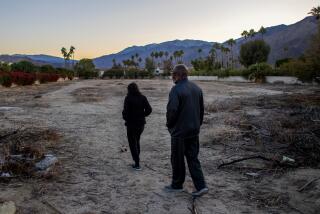Only Way Out for South Africa
- Share via
The Johannesburg City Council held out promise of further progress last week by voting to open legally segregated residential areas to all races and ethnic groups. Although the local resolution carries no official weight--only the president and national government can desegregate living areas--the action symbolizes the widening acceptance in South Africa that apartheid is dying.
After four hours of rigorous debate, the white City Council, emboldened perhaps by the prospect of reform, has called for making the divided nation’s biggest city and financial center a “free settlement” area, a city without legal restrictions on residents.
The progressive resolution specifically calls for a city “in which all people, irrespective of race, color or creed, can own property and live in the residential areas of their choice.” That ideal should be the rule not the exception throughout South Africa.
Residential segregation is a pillar of apartheid. The Group Areas Act, which was passed more than 30 years ago, requires whites, blacks and other racial and ethnic groups to live separately in areas designated solely for a single group. That law reserves most of the cities for the white minority.
South African President Frederik W. de Klerk has promised the repeal of the Group Areas Act in the next session of Parliament, which is scheduled for February. What remains unclear, however, is what measures will replace the restrictions to protect what De Klerk is calling “community life.” Nothing less than the total abolition of legal segregation is equitable.
De Klerk, who on Friday called on his National Party to accept all South Africans, can also encourage residential change. The national government, with the president’s approval, can exempt an area from the restrictive law.
Progress is coming to South Africa--but not smoothly. Steps forward include the freeing of Nelson Mandela and the legalizing of the African National Congress. Steps backward include the tribal and political fighting that has killed so many and the hardening of the pro-apartheid right wing. In that charged atmosphere, the Johannesburg City Council offered a timely new step forward, a reminder of the ultimate goal.
More to Read
Sign up for Essential California
The most important California stories and recommendations in your inbox every morning.
You may occasionally receive promotional content from the Los Angeles Times.













